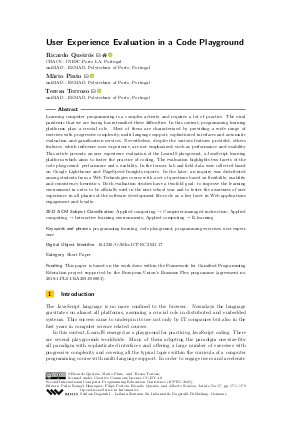User Experience Evaluation in a Code Playground (Short Paper)
Authors
Ricardo Queirós  ,
Mário Pinto
,
Mário Pinto  ,
Teresa Terroso
,
Teresa Terroso 
-
Part of:
Volume:
Second International Computer Programming Education Conference (ICPEC 2021)
Part of: Series: Open Access Series in Informatics (OASIcs)
Part of: Conference: International Computer Programming Education Conference (ICPEC) - License:
 Creative Commons Attribution 4.0 International license
Creative Commons Attribution 4.0 International license
- Publication Date: 2021-07-01
File

PDF
OASIcs.ICPEC.2021.17.pdf
- Filesize: 0.67 MB
- 9 pages
Document Identifiers
Subject Classification
ACM Subject Classification
- Applied computing → Computer-managed instruction
- Applied computing → Interactive learning environments
- Applied computing → E-learning
Keywords
- programming learning
- code playground
- programming exercises
- user experience
Metrics
- Access Statistics
-
Total Accesses (updated on a weekly basis)
0Document
0Metadata
Abstract
Learning computer programming is a complex activity and requires a lot of practice. The viral pandemic that we are facing has intensified these difficulties. In this context, programming learning platforms play a crucial role. Most of them are characterized by providing a wide range of exercises with progressive complexity, multi-language support, sophisticated interfaces and automatic evaluation and gamification services. Nevertheless, despite the various features provided, others features, which influence user experience, are not emphasized, such as performance and usability. This article presents an user experience evaluation of the LearnJS playground, a JavaScript learning platform which aims to foster the practice of coding. The evaluation highlights two facets of the code playground: performance and a usability. In the former, lab and field data were collected based on Google Lighthouse and PageSpeed Insights reports. In the later, an inquiry was distributed among students from a Web Technologies course with a set of questions based on flexibility, usability and consistency heuristics. Both evaluation studies have a twofold goal: to improve the learning environment in order to be officially used in the next school year and to foster the awareness of user experience in all phases of the software development life-cycle as a key facet in Web applications engagement and loyalty.
Cite As Get BibTex
Ricardo Queirós, Mário Pinto, and Teresa Terroso. User Experience Evaluation in a Code Playground (Short Paper). In Second International Computer Programming Education Conference (ICPEC 2021). Open Access Series in Informatics (OASIcs), Volume 91, pp. 17:1-17:9, Schloss Dagstuhl – Leibniz-Zentrum für Informatik (2021)
https://doi.org/10.4230/OASIcs.ICPEC.2021.17
BibTex
@InProceedings{queiros_et_al:OASIcs.ICPEC.2021.17,
author = {Queir\'{o}s, Ricardo and Pinto, M\'{a}rio and Terroso, Teresa},
title = {{User Experience Evaluation in a Code Playground}},
booktitle = {Second International Computer Programming Education Conference (ICPEC 2021)},
pages = {17:1--17:9},
series = {Open Access Series in Informatics (OASIcs)},
ISBN = {978-3-95977-194-8},
ISSN = {2190-6807},
year = {2021},
volume = {91},
editor = {Henriques, Pedro Rangel and Portela, Filipe and Queir\'{o}s, Ricardo and Sim\~{o}es, Alberto},
publisher = {Schloss Dagstuhl -- Leibniz-Zentrum f{\"u}r Informatik},
address = {Dagstuhl, Germany},
URL = {https://drops.dagstuhl.de/entities/document/10.4230/OASIcs.ICPEC.2021.17},
URN = {urn:nbn:de:0030-drops-142338},
doi = {10.4230/OASIcs.ICPEC.2021.17},
annote = {Keywords: programming learning, code playground, programming exercises, user experience}
}
Author Details
Funding
This paper is based on the work done within the Framework for Gamified Programming Education project supported by the European Union’s Erasmus Plus programme (agreement no. 2018-1-PL01-KA203-050803).
References
- Toni Granollers. Usability evaluation with heuristics, beyond nielsen’s list. In ACHI 2018, The Eleventh International Conference on Advances in Computer-Human Interactions, pages 60-65, 2018. URL: https://www.thinkmind.org/articles/achi_2018_4_10_20055.pdf.
- J. Nielsen. Usability engineering. Academic Press, 1993. URL: https://books.google.pt/books?id=fnvJ9PnbzJEC.
- Jacob Nielsen. 10 usability heuristics for user interface design, 1995. URL: https://www.nngroup.com/articles/ten-usability-heuristics/.
- José Carlos Paiva, José Paulo Leal, and Ricardo Queirós. Game-Based Coding Challenges to Foster Programming Practice. In Ricardo Queirós, Filipe Portela, Mário Pinto, and Alberto Simões, editors, First International Computer Programming Education Conference (ICPEC 2020), volume 81 of OpenAccess Series in Informatics (OASIcs), pages 18:1-18:11, Dagstuhl, Germany, 2020. Schloss Dagstuhl-Leibniz-Zentrum für Informatik. URL: https://doi.org/10.4230/OASIcs.ICPEC.2020.18.
- José Carlos Paiva, José Paulo Leal, and Ricardo Queirós. Fostering programming practice through games. Information, 11(11), 2020. URL: https://doi.org/10.3390/info11110498.
- Ricardo Queirós. Learnjs - A javascript learning playground (short paper). In 7th Symposium on Languages, Applications and Technologies, SLATE 2018, June 21-22, 2018, Guimaraes, Portugal, pages 2:1-2:9, 2018. URL: https://doi.org/10.4230/OASIcs.SLATE.2018.2.
- Daniela Quiñones and Cristian Rusu. How to develop usability heuristics: A systematic literature review. Computer Standards & Interfaces, 53:89-122, 2017. URL: https://doi.org/10.1016/j.csi.2017.03.009.
-
Ben Shneiderman. Designing the User Interface: Strategies for Effective Human-Computer Interaction. Addison-Wesley Longman Publishing Co., Inc., USA, 3rd edition, 1997.

- B. Tognazzini. First principles, hci design, human computer interaction (hci), principles of hci design, usability testing. http://www.asktog.com/basics/firstPrinciples.html. Accessed: 2021-03-28.
